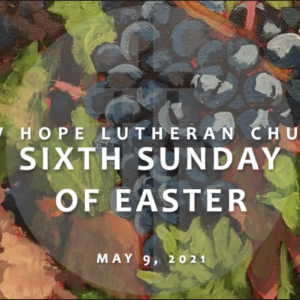John 15:9-17
[Jesus said:] 9 “As God has loved me, so I have loved you; abide in my love. 10 If you keep my commandments, you will abide in my love, just as I have kept God’s commandments and abide in God’s love. 11 I have said these things to you so that my joy may be in you, and that your joy may be complete.
12 “This is my commandment, that you love one another as I have loved you. 13 No one has greater love than this, to lay down one’s life for one’s friends. 14 You are my friends if you do what I command you. 15 I do not call you servants any longer, because the servant does not know what the master is doing; but I have called you friends, because I have made known to you everything that I have heard from God. 16 You did not choose me but I chose you. And I appointed you to go and bear fruit, fruit that will last, so that God will give you whatever you ask him in my name. 17 I am giving you these commands so that you may love one another.”
—————
Please pray with me this morning, church:
Loving God,
You call us to abide—to dwell—in you.
Most days, rest is the furthest thing from our minds
Although we’d probably admit we’re weary.
Re-root us in your love.
Make us produce the good fruit of love
For the sake of our neighbor.
Amen.
—————
You are what you eat. Right?
Like many of you, I’d heard this before, growing up. And I think this statement, coupled with the urban legend that somehow things could take root in your stomach and actually grow inside you is why I had an irrational fear of watermelon-seed-spitting contests.
Like, what if I swallowed one?!
I don’t have space for a watermelon in there!
Still to this day there are certain things I won’t eat, because it’s true, our stomachs have an easier time digesting some things than others.
I’ve been paying much closer attention to what I eat over the last year, and there are absolutely things that add value to ourselves and our bodies, and things that don’t. The problem is, it’s usually the things that don’t add a lot of value that taste the best, right? They have to make up for their lack of value with other ways of making you want and crave and desire those things.
We’re talking about nutrition, right? Things that add value, and things that don’t, maybe even things that take value away.
But beyond just food, there are other parts of our lives—things we think, things we do, things we say, postures or attitudes we adopt—there are certain things or postures or habits that add value…and things that do not…and things that even subtract value.
These are things that might feel good, might taste good, initially…they give you that immediate sense of satisfaction or gratification…but they’re not sustaining, they don’t build up over the long term…in many ways, they’re detrimental to your overall self. Lutheran pastor and author, the Reverend Nadia Bolz-Weber has a wonderful way of describing these things we say and do, if you can abide a little potty humor…these things, she says, “…feel good for a minute…but only in the way peeing in my pants feels warm for a minute. And now it’s cold and wet and it smells bad and I’m embarrassed.”
These are feelings and attitudes of self-righteousness, false piety, vindictiveness, jealousy, revenge, hatred and bigotry, moral superiority, these pervasive feelings that my individual liberties supersede the common good or what’s best for my neighbor… These things we say and do, church…these postures and attitudes that don’t add value to our lives, and even remove value, they may feel good for a moment, they may taste good for a moment…but that feeling is fleeting and they quickly begin to tear you down. They eat at you from the inside.
And this is what I think is helpful to understand about all this stuff to do with fruit from the Gospel of John, and especially from John 15 that we’ve been in for 2 weeks now. This is part of what I think it means to be attached to the vine and to bear good fruit. Because when you abide in the vine, you bear good fruit. You can’t help it, it’s just what you do. German mystic, theologian, and incredible preacher Meister Eckhart wrote that a plum brings forth plums not by an act of will, but because it is its nature to do so. So, too, will we, the body of Christ…gathered around Christ, sharing in Christ’s death and resurrection, and allowing Christ to flow into all our branches and the branches of this body…so, too, will we produce what we must because it is our nature to do so: Godly fruits of compassion, peace, mercy, justice, and love.
When you are connected to the vine, you produce and bear that which you are connected to.
And it really makes me wonder what the heck we’re connected to these days.
I mean, you read the news and headlines and your social media feeds and Twitter and Facebook…and…there’s a lot of stuff out there. There’s a lot of hurt, a lot of pain…a lot of anger…a lot of fear…coming out. It feels so divided. If you’re not with me, you’re against me…and not only are you against me, but you’re my enemy. And the ways that we talk to one another…hatred, and skepticism, and name-calling, and hurtful things, and meanness…
I mean, what the heck are we actually rooted in that’s producing all of this? What are we actually consuming that’s producing this fruit?
I have to wonder if we’re truly rooted in Christ. Or if we just say that we are.
The fruit we bear is a direct reflection of what we’re rooted in.
What are you abiding in? What do you dwell in?
Jesus says, “Abide in me, abide in my love.” Those that abide in Christ bear good fruit because it’s their nature to do so; those that aren’t, don’t.
Take stock of your fruit, church.
Are they Godly fruits…the fruits of the Spirit…love, joy, peace, patience, kindness, goodness, faithfulness, gentleness, and self-control…? Or are they something else…some other kind of…bitter fruit?
But even if the fruit appears good, inspect it even more closely. If one of your fruits is love, how well does it compare to the kind of love Jesus is describing? Is it sacrificial love? Is it a love that would lay down your life for someone else?
“This is my commandment, that you love one another, as I have loved you.”
“If you keep my commandments, you will abide in my love.”
“No greater love has someone than this, to lay down one’s life for one’s friends.”
Is this a tremendously difficult ask of those who follow Jesus? Yes.
Is Jesus speaking metaphorically here? Absolutely not.
We like to romanticize Jesus and talk about how laying down one’s life is giving some of yourself or what you have so that others would have, things like volunteering and maybe giving to a non-profit that rescues sea urchins, but Jesus really is talking about laying down your life for someone else.
It’s Jesus’ path.
It’s the way of the cross.
It’s the path that we are called to as followers of Christ.
Who would you die for?
Who would you give up your life for?
Church, until we truly recognize our neighbors as beloved image-bearers of God’s divine face and worthy of us laying down our life, I think we must be honest that we’re only practicing Christ’s teachings in part.
Those who want to keep their life will lose it. And those who give up their life for my sake and for the sake of Gospel will find it, right?
What does it mean to give up your life for the sake of the Gospel?
“Love one another, as I have loved you.”
It’s not difficult, it’s just demanding.
Loving means truly giving of yourself. Not just volunteering or giving your time and energy. And look, those are important, but love looks behind the needs of the person in front of you, the person you’re serving. Love is taking a vested interest in the well-being of your neighbor. Love asks why they’re standing in front of you, why are they in need at this particular time. Love is interested in the conditions that led to the need for you to give of your time and energy and resource. The Reverend Doctor Cornel West says, “Justice is what love looks like in public.”
Love is interested in justice.
Love seeks the best for the one being loved.
Even if that means giving up something of yourself.
That’s a lesson that I don’t think we’ve learned very well this year. I think we struggle greatly when the cost to me of loving my neighbor means that I have to give something up.
It hurts me to think how we’ve misunderstood Jesus. Or how we’ve heard Jesus and understood what Jesus was saying but decided that the cost of love, the cost to my own feelings or preferences or desires, outweigh the needs of my neighbor.
The good news, though, church, is that we’ve got an opportunity to re-root ourselves. We can take stock of the fruit we’re producing, hold it up to the kind of fruit we’re expected to produce being attached to the vine of Christ, and be re-attached to the vine that produces good and tasteful fruit.
I ended up preaching an unintentional series on evangelism in this season of Easter, and if I would have had that kind of forethought, I would have made a nice graphic and put some language around the theme, and really made it a series. Instead what I hope you’ve heard over the past 6 weeks is that we have an opportunity as we’re making our way through and, with God’s help, out of this pandemic. We have an opportunity to be resurrected and transformed and to reshape who we were into who we are being called to be. God is calling us into our neighborhoods, to truly invest ourselves in the lives of our neighbors, to invite them to join you in this work of making our world just a bit more reflective of God’s vision. As a community of faith, we have an opportunity to examine how we’re doing things, and to invite folks to be transformed by the same power of the Gospel.
Like our story from Acts, we just might be surprised at where the Holy Spirit shows up.
In fact, I’m counting on it.
That’s good fruit that adds value to the body and builds the body up.

